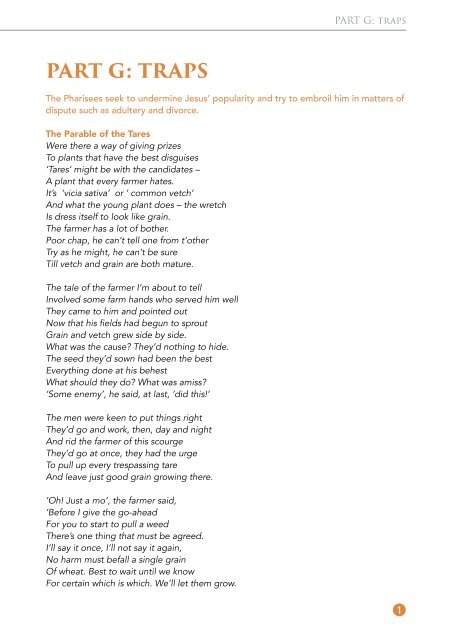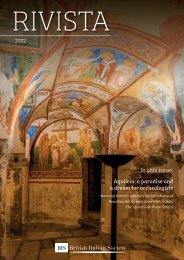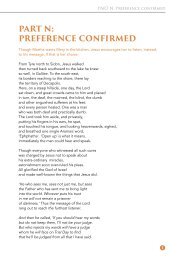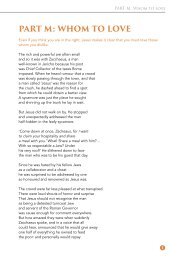You also want an ePaper? Increase the reach of your titles
YUMPU automatically turns print PDFs into web optimized ePapers that Google loves.
<strong>PART</strong> G: traps<br />
<strong>PART</strong> G: TRAPS<br />
The Pharisees seek to undermine Jesus’ popularity and try to embroil him in matters of<br />
dispute such as adultery and divorce.<br />
The Parable of the Tares<br />
Were there a way of giving prizes<br />
To plants that have the best disguises<br />
‘Tares’ might be with the candidates –<br />
A plant that every farmer hates.<br />
It’s ‘vicia sativa’ or ‘ common vetch’<br />
And what the young plant does – the wretch<br />
Is dress itself to look like grain.<br />
The farmer has a lot of bother.<br />
Poor chap, he can’t tell one from t’other<br />
Try as he might, he can’t be sure<br />
Till vetch and grain are both mature.<br />
The tale of the farmer I’m about to tell<br />
Involved some farm hands who served him well<br />
They came to him and pointed out<br />
Now that his fields had begun to sprout<br />
Grain and vetch grew side by side.<br />
What was the cause? They’d nothing to hide.<br />
The seed they’d sown had been the best<br />
Everything done at his behest<br />
What should they do? What was amiss?<br />
‘Some enemy’, he said, at last, ‘did this!’<br />
The men were keen to put things right<br />
They’d go and work, then, day and night<br />
And rid the farmer of this scourge<br />
They’d go at once, they had the urge<br />
To pull up every trespassing tare<br />
And leave just good grain growing there.<br />
‘Oh! Just a mo’, the farmer said,<br />
‘Before I give the go-ahead<br />
For you to start to pull a weed<br />
There’s one thing that must be agreed.<br />
I’ll say it once, I’ll not say it again,<br />
No harm must befall a single grain<br />
Of wheat. Best to wait until we know<br />
For certain which is which. We’ll let them grow.<br />
q
A gospel in blank verse with rhymed parables<br />
Then the day will surely dawn<br />
When we are certain which is corn<br />
And which is weed.<br />
Alright, if that’s agreed<br />
When harvest comes, first bundle the tares<br />
And burn them up! They’re gone! Who cares?<br />
But making sure it comes to no harm<br />
Store the good grain carefully in my barn.’<br />
When his disciples had him on his own<br />
they questioned Jesus. ‘Please explain to us<br />
the meaning of the story of the tares –<br />
the weeds that grew among the ears of corn.’<br />
So Jesus gave a full reply. He said,<br />
‘ I, Son of Man, sow good seed in the field.<br />
The seeds are men and women everywhere.<br />
They are the children of the King of Heaven.<br />
The weeds are offspring of the Evil One.<br />
The harvest is the Ending of the Age.<br />
Battalions of angels will appear<br />
who’ll act as reapers, and make certain that<br />
all of the Devil’s progeny are burned –<br />
all gathered up and thrown into a fire.<br />
They’ll weep and gnash their teeth eternally.<br />
The righteous and the virtuous will live<br />
for ever in the Father’s joyful house<br />
shining as brightly as the noonday sun.<br />
You must believe me: that’s how it will be.’<br />
When in a synagogue one Sabbath day<br />
the Lord was talking to the gathering.<br />
He saw a woman staring at the floor<br />
whose back was bent. She could not straighten up<br />
and this infirmity had been with her<br />
for eighteen years. For all that time she’d stooped.<br />
So Jesus paused and called her to his side.<br />
He placed his healing hands on her and said,<br />
‘You are released from this captivity.<br />
The bondage you have suffered is no more.’<br />
Then she stood up, and praised God in the way<br />
that others could, her head held high in thanks.<br />
w
<strong>PART</strong> G: traps<br />
The rulers of the synagogue were not<br />
impressed. ‘The days for doing work are clear.<br />
The Sabbath is not one of them. If you<br />
want healing, please come back some other day.’<br />
‘You wretched hypocrites!’ the Lord exclaimed.<br />
‘Do you not every Sabbath day, yourselves<br />
untie your ox or ass from where it feeds<br />
to lead it out to water? Here we have<br />
a woman, not a donkey or a cow,<br />
but someone of the tribe of Abraham<br />
whom Satan has tied down for eighteen years<br />
and you object to her release today<br />
because it is a Sabbath!? ‘ It was clear<br />
that those who’d lodged objections were quite wrong.<br />
Jesus was showered with praise for what he’d done,<br />
Sabbath or not.<br />
And later on the Lord made the same point<br />
when he was dining with a Pharisee.<br />
Jesus was being closely watched by Scribes<br />
and Pharisees, and once again it was<br />
a Sabbath day. They brought to him a man<br />
with dropsy – nowadays ‘oedema’ is<br />
the name we’d give it – and the sufferer<br />
has swellings, pain, and sometimes blistering.<br />
‘So should I heal this man, today?’ he asked.<br />
‘Would that be lawful? Should I heal, or not?<br />
But no-one would reply. While silence reigned<br />
he grasped the man and healed him, and at once<br />
sent him rejoicing on his way.<br />
To undermine his credibility<br />
his critics said that he must be possessed.<br />
Some unclean spirit had now made its home<br />
within his human frame: that would explain<br />
his healing powers and so-called miracles.<br />
What unambiguous reproof they had!<br />
“The only sin that’s unforgivable<br />
is blasphemy against the Holy Ghost:<br />
for every blasphemy can be forgiven<br />
including those against the Son of Man,<br />
but ones against the Holy Spirit stand<br />
for ever – yes, – throughout eternity.<br />
e
A gospel in blank verse with rhymed parables<br />
The Parable of the Rich Man and Lazarus<br />
Purple was the colour<br />
Worn by the rich<br />
They were the ones<br />
Who could order a dish<br />
Of any fine food that should<br />
Tickle their fancies<br />
They had no worries .<br />
They had the finances<br />
To calm all their troubles<br />
And ease all their cares.<br />
The world was their oyster<br />
And they gave themselves airs.<br />
Such was the lifestyle<br />
Of a man we’ll call Dives. (dye-vees)<br />
He’d no reputation<br />
For generous freebies.<br />
Indeed it is true<br />
And it’s sad to relate<br />
He gave not one thought<br />
To the man at his gate.<br />
Lazarus was his name,<br />
Grindingly poor<br />
Hoping to pick up<br />
Some scraps by his door.<br />
He was fed on …fresh air!<br />
All conspired to defeat him<br />
Nought for his comfort<br />
No friends to greet him<br />
Unless you count dogs.<br />
They licked at the sores<br />
On his uncovered back…<br />
But here we must pause.<br />
You get the picture.<br />
Fast forward to find<br />
Both men are dead.<br />
They’ve now left behind<br />
The lives they’d each known.<br />
What’s happened to Dives?<br />
Where can we find him?<br />
Oh! Down there in Hades<br />
Half cooked in the fires<br />
And tortured by thirst.<br />
r
<strong>PART</strong> G: traps<br />
But before we look close at him<br />
Let us go first<br />
To find where the angels<br />
(Who called when he died)<br />
Had deposited Lazarus…<br />
…At Abraham’s side!<br />
They’re bosom friends it seems.<br />
Roles are reversed.<br />
Poor Lazarus feasts<br />
And rich Dives thirsts.<br />
Then a voice from below calls,<br />
‘Look down! Here I am!<br />
It’s me, your friend, Dives<br />
Please help, Abraham.<br />
Send that man Lazarus<br />
(I know him, I think)<br />
I must have some water<br />
Just a droplet to drink<br />
A drip from his finger<br />
To cool my parched tongue.<br />
Tell him to hurry<br />
It won’t take him long.’<br />
‘I’m sorry my son<br />
What can I say?<br />
You misused your life<br />
Now it’s your turn to pay.<br />
Both hunger and thirst<br />
Poor Lazarus knew.<br />
Now he’s happy in heaven<br />
Which is only his due.<br />
But you don’t understand<br />
What it is that you ask.<br />
The thing has become<br />
An impossible task –<br />
To cross to the place<br />
Where you are in pain<br />
Then do a quick turn<br />
And come back again.<br />
No! A great abyss divides us<br />
Can we help? Not a whit!<br />
A chasm prevents us<br />
A bottomless pit.<br />
t
A gospel in blank verse with rhymed parables<br />
Then send Lazarus to warn<br />
All my brothers ... I’ve five...<br />
To tread paths of virtue<br />
While they are alive<br />
In case they too should suffer<br />
A fate such as mine<br />
Please send to them quickly<br />
There may yet be time.<br />
They’ve the prophets and Moses<br />
Let’s not condemn.<br />
There’s time enough yet:<br />
They may listen to them.<br />
They’ll never do that!<br />
But if he rose from the dead<br />
And went and explained<br />
They would do what he said.<br />
If the prophets and Moses<br />
Haven’t been heard<br />
They will listen to no one<br />
The idea’s absurd.<br />
They are deaf to the message.<br />
All has been said.<br />
They’d pay no attention<br />
If he rose from the dead.<br />
The Lord knew well that Herod Antipas<br />
would like to see him silenced and despatched.<br />
Herod’s supporters, called Herodians,<br />
backed Herod, though they recognised by this,<br />
they gave approval to the Roman rule.<br />
Their interest was mainly politics<br />
and they had little time for Pharisees.<br />
But Herod’s men and Pharisees agreed<br />
that getting rid of Jesus suited both.<br />
Perhaps they could entangle him in talk:<br />
get him to disapprove of Roman power.<br />
They’d flatter him and put him off his guard<br />
and smuggle in some covert witnesses.<br />
And thus the confrontation was set up.<br />
y
<strong>PART</strong> G: traps<br />
‘Rabbi,’ they said, ‘we know you always speak<br />
straight from your heart, the truth from God Himself,<br />
and men, to you, however eminent<br />
are by comparison of no account.<br />
Should we pay Caesar taxes, do you think?’<br />
‘Oh, what a combination of deceit<br />
and villainy we’ve gathered here, today!<br />
(For he saw through their craftiness at once).<br />
‘Show me the money for the tax,’ he said.<br />
They brought a coin. ‘Well, now! Whose head is this?’<br />
‘Why, Caesar’s,’ they replied. ‘Then give it him!<br />
Give Caesar what is Caesar’s and give God<br />
whatever’s God’s alone’. And silently,<br />
and marvelling at how he had escaped<br />
their trap, they left him, utterly abashed.<br />
While they were in Capernaum ‘The Rock’<br />
was asked if Jesus paid the Temple Tax.<br />
The current tax was half a shekel each.<br />
Peter replied he did, but back at home<br />
the Lord approached him and said this, ‘Tell me,<br />
from whom do earthly potentates take tax?<br />
Do they collect their revenues from sons<br />
or from the rest?’ ‘From others,’ Peter said.<br />
‘The sons are then tax-free. Is that not so?<br />
However, so as not to cause offence<br />
take rod and line, go to the lake, and make<br />
a cast. The first fish that you catch will have<br />
a shekel in its mouth. It is enough<br />
to pay the taxes for both you and I.<br />
See that you get it paid.’<br />
Two subjects that concerned the Pharisees<br />
adultery and divorce – were unresolved.<br />
The Shammaites and Hellelites, two sects<br />
within the Pharisaic fold, took up<br />
positions that were widely different.<br />
The first held that divorce was possible.<br />
A wife in cases where a husband failed<br />
to provide appropriately the food,<br />
the clothes and marriage rights that were her due,<br />
could be divorced and marry once again.<br />
u
A gospel in blank verse with rhymed parables<br />
The Hellelites were more concerned that men<br />
should not be bound to women whom they felt<br />
had proved to be unsatisfactory wives.<br />
This led to the approval of divorce<br />
for reasons that could seem quite trivial.<br />
No doubt the Lord’s opinion was sought<br />
more in the hope that an entanglement<br />
with one side or the other would result<br />
in his discredit. Jesus concentrates<br />
however, not on the law, but morals<br />
and the responsibilities of men.<br />
‘There’s many have enjoined you to avoid<br />
adultery: but this is what I say.<br />
To look at any woman lustfully<br />
means that you have committed sin with her.<br />
The sin has been committed in your heart.<br />
Time after time the Pharisees sought ways(G10)<br />
of showing that the Lord had no regard<br />
for the Mosaic Law. And thus it was<br />
quite early in the morning that they brought<br />
a woman to him seen that very night<br />
caught ‘in flagrante’ and beyond dispute<br />
in an adulterous act. There was a crowd.<br />
It seemed the perfect time to catch him out.<br />
‘Rabbi,’ they interposed,’ this woman here<br />
is an adulteress. Women such as she<br />
deserve stoning and death, for that command<br />
was given us by Moses. What say you?<br />
The woman, quite alone, was forced to stand,<br />
censorious male eyes encircling her.<br />
Jesus made no reply: indeed he bent,<br />
as if ignoring their sharp questioning<br />
to write some words upon the dusty ground.<br />
With careful finger he marked out a phrase.<br />
His questioners refused to let him be.<br />
‘An answer! Answer! Answer!’ was the cry.<br />
The Lord stood up and gazed at them and at<br />
the lonely, guilty woman in their midst.<br />
‘Well, let the man who’s sinless in such things<br />
be first to throw a stone,’ was his reply.<br />
i
<strong>PART</strong> G: traps<br />
Then, bending down, he started once again<br />
to form large letters with his finger tips.<br />
For moments, all were silent, every one.<br />
The eldest was the first to move, and he,<br />
his face suffused with shame, left quietly.<br />
No longer were their eyes upon the girl<br />
but on the chastened faces of the men<br />
who stood around her. Sheepishly and one<br />
by one, they left until she stood alone.<br />
At that, the Lord stopped writing and unbent.<br />
He spoke to her with utmost courtesy.<br />
‘Has no one then condemned you? Where’ve they gone?’<br />
‘Since you last spoke, no one’s condemned me, Lord’,<br />
was her reply. ‘No more do I,’ he said,<br />
‘but you must give this up.’ He said no more.<br />
The Pharisees asked Jesus once again<br />
a question that they hoped would trip him up.<br />
‘Can one, for any cause, divorce a wife?’<br />
‘Surely you’ve read in Scripture,’ Jesus said<br />
‘how God intended from the very first<br />
to make a male and female into one.<br />
The natural thing is for a man to leave<br />
his parents’ home and do the same himself<br />
and form a partnership – a unity.<br />
And thus, when married, man and wife become<br />
as if they were one flesh and all is well.’<br />
The second question was more difficult<br />
They hoped to make him contradict himself.<br />
‘So why did Moses, then, allow divorce?’<br />
‘Because your hard hearts were un-teachable<br />
and you were unprepared to do God’s will:<br />
so Moses had no choice but to allow<br />
you to divorce. Permission could be gained<br />
for you to break loose from your marriage bonds.<br />
It was not always so.’ Then, later on,<br />
alone with his disciples, Jesus said,<br />
in answer to their further questioning,<br />
‘Those who divorce and marry once again<br />
commit adultery, unless they part<br />
because their marriage vows have been ignored.’<br />
o
A gospel in blank verse with rhymed parables<br />
One Pharisee asked Jesus to a meal.<br />
The Lord accepted and sat down to eat.<br />
A woman, with a reputation none<br />
would envy, learned that he was close at hand<br />
and left her city home and came to him.<br />
She carried in her hand some spikenard –<br />
an ointment in an alabaster flask,<br />
sweet-smelling, very costly and sealed tight.<br />
It’s likely that she’d met the Lord before<br />
and told him of the life that she had led.<br />
He must have listened and forgiven her.<br />
This social gathering at Simon’s house<br />
Was just the time and place for her to show<br />
her heartfelt gratitude, expensively.<br />
As custom was, each guest sat on a couch<br />
and thus, with feet extended, Jesus watched<br />
the woman move towards his seat and start<br />
to cry. There was no stopping her. She wept<br />
and wept until his sandaled feet were wet<br />
with tears. She wiped them with her hair and kissed<br />
each foot until, at last, she broke the seal<br />
upon the alabaster jar and used<br />
the ointment to refresh and to console.<br />
His host, the Pharisee was looking on<br />
with some disgust. He’d wanted to find out<br />
what kind of man this ‘Jesus’ was, and now<br />
he knew – no prophet, certainly. A man<br />
of God would have perceived, without a doubt,<br />
the woman was a wanton and a whore.<br />
He would not have allowed her in his sight<br />
nor, worse than that, submitted to her touch.<br />
All this he saw, but yet made no remark.<br />
The Lord was well aware of what he thought.<br />
‘Well, Simon,’ Jesus said, ‘I’d like a word.’<br />
‘What is it, Rabbi?’ asked the Pharisee.<br />
‘There were two men in debt. The first, let’s say<br />
owed just five hundred pounds. The second man<br />
owed ten times that amount – five thousand pounds.<br />
Both borrowed money from a generous man:<br />
a
<strong>PART</strong> G: traps<br />
indeed, the same man was their creditor.<br />
When neither of them found that they could pay<br />
the creditor wrote off the debts of both.<br />
Which, do you think, would feel most gratitude?<br />
Whom do you think would love their patron most?’<br />
‘The one who was excused the larger sum,’<br />
the Pharisee replied, ‘He’d been let off<br />
from paying so much more.’ ‘Of course you’re right,’<br />
said Jesus, ‘Now then Simon, look at her!’<br />
The woman was still weeping tears of thanks.<br />
‘When I came here I got no bowl in which<br />
to wash the dirt encrusted on my feet.<br />
You did not give me one. Yet she has washed<br />
my feet in tears and dried them with her hair.<br />
No greeting of affection did I get<br />
but she has never ceased to kiss my feet:<br />
and you did not anoint my head with oil<br />
but she did: at considerable cost.<br />
So listen then to this: her numerous sins,<br />
her many, many, misdemeanours, I’ve<br />
forgiven – and what we all have witnessed<br />
is confirmation of her gratitude.<br />
has soothed my feet with tears of love.<br />
So listen then to this: her numerous sins,<br />
her many, many, misdemeanours, are<br />
forgiven – all, because she loved so much.<br />
The one forgiven little, little loves.’<br />
Then to the woman he said this.<br />
‘Your sins have been forgiven you and all is well’.<br />
But there were murmurings among the guests.<br />
‘Who is this man who even forgives sins?’<br />
they muttered doubtfully.<br />
s
A gospel in blank verse with rhymed parables<br />
d

















